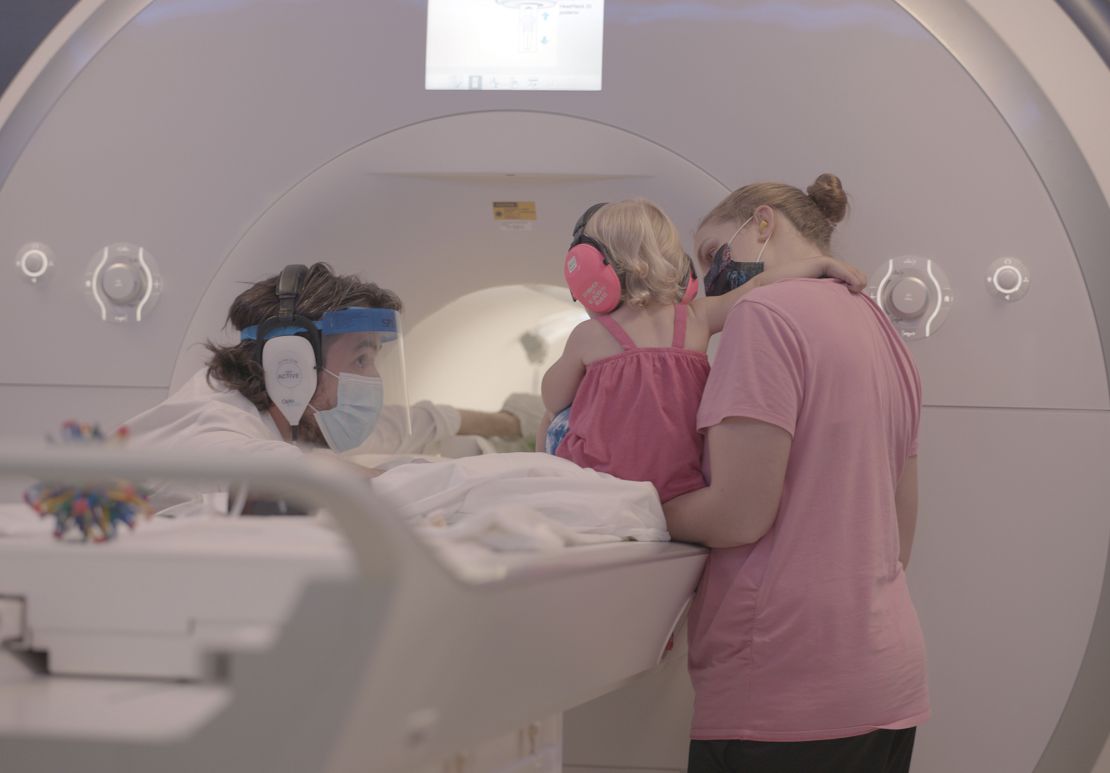Get inspired by a weekly roundup on living well, made simple. Sign up for CNN’s Life, But Better newsletter for information and tools designed to improve your well-being.
CNN
—
Do you ever wonder what it was like to be a baby? But no matter how hard you try, you can’t remember any of the details?
It’s not that you don’t have memories from infancy — it’s that you simply can’t access them later in life, new research shows.
The study, published Thursday in the journal Science, examined 26 infants ranging from 4.2 to 24.9 months, split into two age groups: those younger than 12 months and those 12 to 24 months.
During the experiment, babies were placed in an fMRI machine and shown a series of unique images for two seconds each. Researchers aimed to record activity in the hippocampus — the portion of the brain associated with emotions, memory and the autonomic nervous system.
“The hippocampus is a deep brain structure that is not visible to standard methods, so we had to develop a new approach for conducting memory experiments with babies inside an MRI machine,” said Dr. Nick Turk-Browne, lead study author and professor in the department of psychology at Yale University, via email. “This kind of research has previously been done mostly while infants are asleep, because they wiggle a lot, cannot follow instructions and have short attention spans.”
Dr. Simona Ghetti, a professor in the department of psychology at the University of California, Davis, whose research focuses on the development of memory in childhood, acknowledged that while many studies have already demonstrated infants’ capacity to encode memories, this latest research is unique in that it links memory encoding to hippocampal activation. Ghetti was not involved in the study.
After a momentary delay, the babies were then shown two images side by side: one of familiar images they had seen before and one that was new. Researchers tracked the babies’ eye movements, noting which image they focused on longer.
If an infant spent more time looking at the familiar image, it suggested they recognized it, indicating memory recall. If they didn’t show any preference, it likely meant their memory was less developed, according to the study.
“Eye movements have been used in hundreds of studies on infant memory and categorization,” Ghetti said via email. “Infants look at what they find interesting, and researchers have long leveraged this spontaneous behavior to derive information about memory functioning.”

Once they collected the initial data, the team analyzed fMRI scans of babies who looked at the familiar image longer, comparing them with those who had no preference. Trials were excluded if the baby wasn’t focused on the screen and moved or blinked excessively.
The findings revealed that the hippocampus was more active in older infants when encoding memories. Additionally, only older infants exhibited activity in the orbitofrontal cortex, which plays a key role in memory-related decision-making and recognition.
“One thing we have learned about memory in adults is that the information we tend to capture and encode into memory are things that are highly relevant to our experience,” said Dr. Lila Davachi, a professor in the department of psychology at Columbia University, who was not involved in the study. “The amazing thing about this study is convincingly showing hippocampal encoding processes in babies for stimuli that are, in some sense, unimportant to them.”
Though it’s still unclear why memory encoding seems to be stronger in babies more than 12 months old, it’s likely a result of major alterations taking place in the body.
“The infant brain undergoes many perceptual, linguistic, motor, biological and other changes around this time, including the rapid anatomical growth of the hippocampus,” Turk-Browne said.
Turk-Browne and his team are actively working to test why the brain is unable to retrieve these early memories in life, but he speculates that the brain processing in infants may suggest the hippocampus isn’t receiving the accurate “search terms” to find the memory as it was stored based on the experiences the baby was having at the time.
Ghetti encourages parents to think about the impact infancy has on their children, even if the children can’t retrieve memories they experienced at such an early age.
Babies are learning an enormous amount at this age, which is how they begin to take in an entire language by associating sounds with meanings, Ghetti said. She added that infants are also forming expectations around their family members and studying properties of objects and the world around them.
Parents often see this learned behavior when they sing the same song or read the same book, which Davachi noted produces a familiar response in older children.
“Using repetition with babies will open up a greater connection between parent and baby,” she said via email.
Even though you can’t recall those earliest memories as an adult, it’s fair to say that you’re learning from those experiences, which can be true for both neutral and emotional information, Ghetti said.
“This can remind parents that infancy is not idle time and that infants are learning a great deal,” Ghetti said. “Offering opportunities for visual exploration may be important for cultivating learning skills.”

